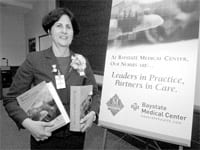Baystate Medical Center And Its Nurses Achieve ’Magnet’ Recognition
SPRINGFIELD – Baystate Medical Center and its nurses have been named a Magnet™ hospital for excellence in nursing services by the American Nurses Credentialing Center (ANCC), a subsidiary of the American Nurses Assoc., earning what less than 3{06cf2b9696b159f874511d23dbc893eb1ac83014175ed30550cfff22781411e5} of the nation’s hospitals have achieved.
Earning Magnet hospital status is among the highest of distinctions a hospital and its nurses can achieve, recognizing the outstanding caliber of its nursing staff. There are just five Magnet Hospitals in Massachusetts, including Baystate Medical Center, and only 13 in New England and 170 nationwide.
The Magnet Recognition Program® establishes standards of excellence which health care organizations must attain. Magnet designation helps consumers locate health care organizations that have a proven level of excellence in nursing care and assists hospitals in attracting and retaining quality employees.
“Magnet designation is nursing’s top honor, accepted nationally as the gold standard in nursing excellence,” said Deborah Morsi PhD, RN, vice president, Patient Care Services for Baystate Medical Center, and chief nursing officer for Baystate Health.
“Nurses are key to the delivery of health care and successful patient outcomes. We simply could not function without them and could not provide the high quality care and positive outcomes we do without the commitment of our nursing staff,” she added.
Morsi noted the tremendous teamwork needed by hospital staff to even be considered for Magnet status.
“While we commend our nurses and nursing leaders for this outstanding achievement, I think they would be the first to say that they could not have achieved this alone. A Magnet hospital has physicians and employees in all areas who work together to support patients, and one another, to create an environment where outstanding care is the rule,” Morsi said.
An article in the American Journal of Nursing in 2000 entitled, “The Magnet Nursing Services Recognition Program: A Comparison of Two Groups of Magnet Hospitals,” called Magnet “a seal of approval for quality nursing care.”
The article went on to note: “In an environment rife with controversy about patient safety in hospitals, medical error rates, and nursing shortages, consumers need to know how good the care is at their local hospitals.”
“I congratulate the entire nursing staff of Baystate Medical Center, who have now joined an elite group of nurses nationwide identified as providing the very best in nursing care. Recognizing quality patient care and nursing excellence, the Magnet Recognition Program provides consumers with the ultimate benchmark to measure the quality of care that they can expect to receive at top hospitals around the country such as Baystate Medical Center,” said Mark R. Tolosky, president and chief executive officer of Baystate Medical Center.
Manget status recognizes excellence in a variety of areas including nursing management, philosophy and practices; adherence to standards for improving quality of patient care; leadership of the nurse administrator in supporting professional practice and continued competence of nursing personnel; and understanding and respecting the cultural and ethnic diversity of patients, their families and significant others, and the care providers in the system.
Magnet-designated health care organizations consistently outperform their peers in recruiting and retaining nurses, resulting in increased stability in patient care systems across the organization. Also, research documents that high quality nurses is one of the most important attributes in attracting high quality physicians.
The Magnet Recognition Program was developed by the American Nurses Credentialing Center, a subsidiary of the American Nurses Association, to recognize health care organizations that provide the very best in nursing care and uphold the tradition within nursing of professional practice. In 1983, the American Academy of Nursing’s task force on nursing practice in hospitals conducted a study of U.S. hospitals. The research identified and described variables that created an environment that attracted and retained well-qualified nurses. These variables were called ‘forces of magnetism’ and the institutions were called ‘Magnets’ because they attracted and kept good nurses. The study found that quality patient care was provided through sustaining excellence in nursing services.
To earn Magnet status, organizations must apply to the American Nurses Credentialing Center and undergo a vigorous, multi-faceted evaluation, a process which is thorough and lengthy, and that includes extensive interviews and review of nursing services, clinical outcomes and patient care. For some hospitals, the journey to reaching Magnet status can take upwards to five years, Baystate Medical Center completed its journey in two years.
The Magnet Recognition Program is based on quality indicators and standards of nursing practice as defined in the American Nurses Association’s “Scope and Standards for Nurse Administrators.” And the Magnet designation process includes the appraisals of both qualitative and quantitative factors in nursing.
According to the ANCC, there are multiple benefits for patients to select a Magnet hospital. Magnet-designated facilities consistently outperform non-Magnet organizations, deliver better patient outcomes, experience increased time spent at the bedside of patients, have shorter lengths of patient stay, have lower patient mortality rates, enjoy increased nurse retention and recruitment rates, reporter higher rates of job satisfaction, and report higher patient satisfaction rates.
According to Morsi, the Magnet designation process creates a “Magnet culture” which is holistic in establishing a dynamic and positive environment in which professional nurses can grow and prosper. Core values such as empowerment, pride, mentoring, nurturing, respect, integrity, and teamwork are demonstrated at Magnet facilities.
“Magnet standards are a blueprint for hospitals such as Baystate Medical Center who want to further strengthen their organization to support professional practice, achieve nurse satisfaction, and achieve good patient outcomes,” Morsi said.
“The journey to Magnet and the intense look it provided us in the way we deliver nursing care, supported our quest in nursing for further development and growth as we strive for the best possible patient outcomes,” she added.
For more information on the Magnet Recognition Program, visitwww.nursingworld.org/ancc.



Comments are closed.